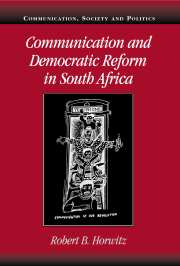Book contents
- Frontmatter
- Contents
- List of Tables
- Preface and Acknowledgments
- List of Acronyms and Abbreviations
- 1 Introduction and Overview
- 2 The Ancien Régime in the South African Communications Sector
- 3 “Sharing Power without Losing Control”: Reform Apartheid and the New Politics of Resistance
- 4 “Control Will Not Pass to Us”: The Reform Process in Broadcasting
- 5 “All Shall Call”: The Telecommunications Reform Process
- 6 Free but “Responsible”: The Battle over the Press and the Reform of the South African Communication Service
- 7 Conclusion: Black Economic Empowerment and Transformation
- Appendix
- References
- Index
3 - “Sharing Power without Losing Control”: Reform Apartheid and the New Politics of Resistance
Published online by Cambridge University Press: 04 December 2009
- Frontmatter
- Contents
- List of Tables
- Preface and Acknowledgments
- List of Acronyms and Abbreviations
- 1 Introduction and Overview
- 2 The Ancien Régime in the South African Communications Sector
- 3 “Sharing Power without Losing Control”: Reform Apartheid and the New Politics of Resistance
- 4 “Control Will Not Pass to Us”: The Reform Process in Broadcasting
- 5 “All Shall Call”: The Telecommunications Reform Process
- 6 Free but “Responsible”: The Battle over the Press and the Reform of the South African Communication Service
- 7 Conclusion: Black Economic Empowerment and Transformation
- Appendix
- References
- Index
Summary
Parastatal reform was part of the government's broader project to modify the apartheid system. Apartheid may have been a multifaceted, systemic method of political oppression along racial lines, but, at bottom and in origin, it was a system for the control of labor. “Reform apartheid”, inaugurated by P. W. Botha's verligte faction of the National Party, represented the recognition that that system of control had become dysfunctional, that many of the structures guaranteeing white privilege were now incompatible with the demands of a modern economy. Reform apartheid comprised a contradictory set of strategies: the improvement of the basic conditions of black life but the lessening of state intervention in the economy; devolution of political power to local areas but maintainence of the prohibition against African participation in national political life. With respect to the parastatals, reform apartheid resulted in both their expansion and the attempt to privatize them. Reform apartheid's aim was to end formal apartheid but reconsolidate white supremacy through the market and a restricted political franchise. This propelled, in classic dialectical fashion, the emergence of a broad, coherent internal opposition movement against the government's top–down reforms. The violent conflict over the reform of apartheid in the 1980s set the stage for February 1990 and structured the political struggles over the parastatals in the democratic transition period. In the activist anti-apartheid civil society organizations lay the groundwork for the political culture of consultation and transparency characteristic of the post–February 1990 democratic transition period.
- Type
- Chapter
- Information
- Communication and Democratic Reform in South Africa , pp. 87 - 119Publisher: Cambridge University PressPrint publication year: 2001



